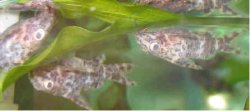treecat
New Member
Well I'm still a new guy at this.
Flavobacterium colmnare
Anti-bacterial medications should cure this disease if used promptly. At later stages, the bacteria may invade internal organs, in which case only antibiotics may be effective. Several strains exist which vary in their virulence (how 'aggressively' they cause disease)..

treecat
Flavobacterium colmnare
Anti-bacterial medications should cure this disease if used promptly. At later stages, the bacteria may invade internal organs, in which case only antibiotics may be effective. Several strains exist which vary in their virulence (how 'aggressively' they cause disease)..

treecat
